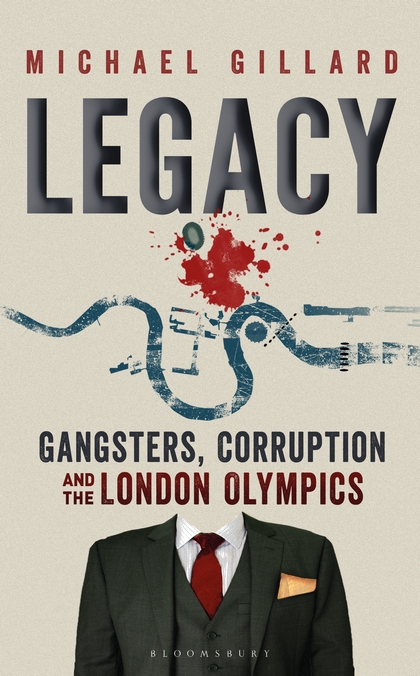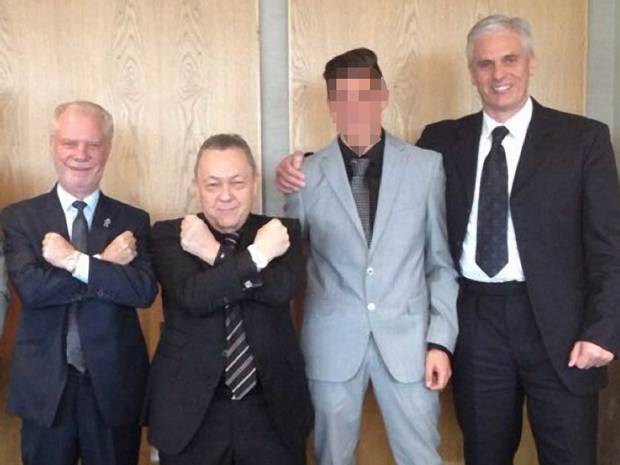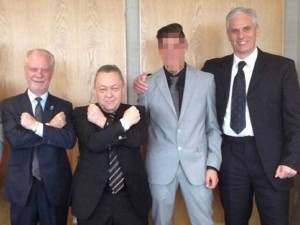ONE of the UK’s most powerful narco-traffickers will finally face the courtroom next year following his arrest in Spain almost two years ago.
Nottingham born Robert Dawes, 45, is charged with organising a 1.3 tonnes shipment of cocaine from Venezuela and seized in suitcases from a flight which touched down at Charles de Gaulle airport Roissy, Paris in September 2013, according to French prosecutors.
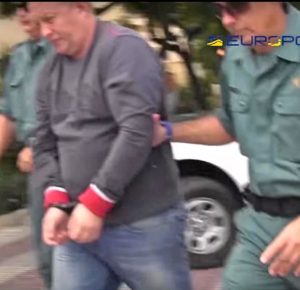
The moment Dawes was led away from his Spanish villa by Guardia Civil officers to face extradition to France
More details have also emerged about the case against the British crime lord from the French prosecutor’s indictment, including Dawes’ links to two British men arrested in Paris and to a wing of the Italian Camorra mafia.
According to French investigators, the operation against Dawes began on 8 July 2013 when information was received that a large consignment of cocaine was going to be sent from Venezuela to France via a passenger flight. The information stated that a British organised crime group was behind the shipment.
More information came through to French investigators enabling them to tag Roissy airport about 20 miles from the centre of Paris as the destination point. On September 11 the shipment arrived in 31 suitcases belonging to “ghost” passengers. Having intercepted the shipment by stealth, French investigators then placed undercover officers via an informant into the baggage handling facility at Charles-de-Gaulle airport.
On September 16 2013 the undercover baggage handler’s phone rang. The voice was a man speaking in English calling himself “Marcus”. A meeting was arranged for that evening in Paris. Location? Under the Eiffel Tower. “Marcus”, the evidence will say turned out to be a 34-year-old Nottinghamshire born man called Nathan Wheat.
Nathan Wheat born in Mansfield in 1983 was a known associate of Robert Dawes who, like his boss, lived on Spain’s Mijas Costa. Records showed he had also visited Venezuela in April 2013. Investigators believe this would have been to oversee the logistics of the Caracas to Paris transport operation on behalf of Robert Dawes. Several Venezuelan police officers with alleged links to the Venezuelan outfit Cartel de Los Soles and a Caracas airport remit would later be arrested. At the Eiffel Tower meet, “Marcus” handed a Dutch-sourced Blackberry encrypted with PGP technology to the undercover baggage handler “Sergio” and told him this was to be the only form of communication to be used from there on. Similar Dutch-sourced Blackberry mobiles with PGP encryption would later be discovered when Guardia Civil raided Robert Dawes palatial villa
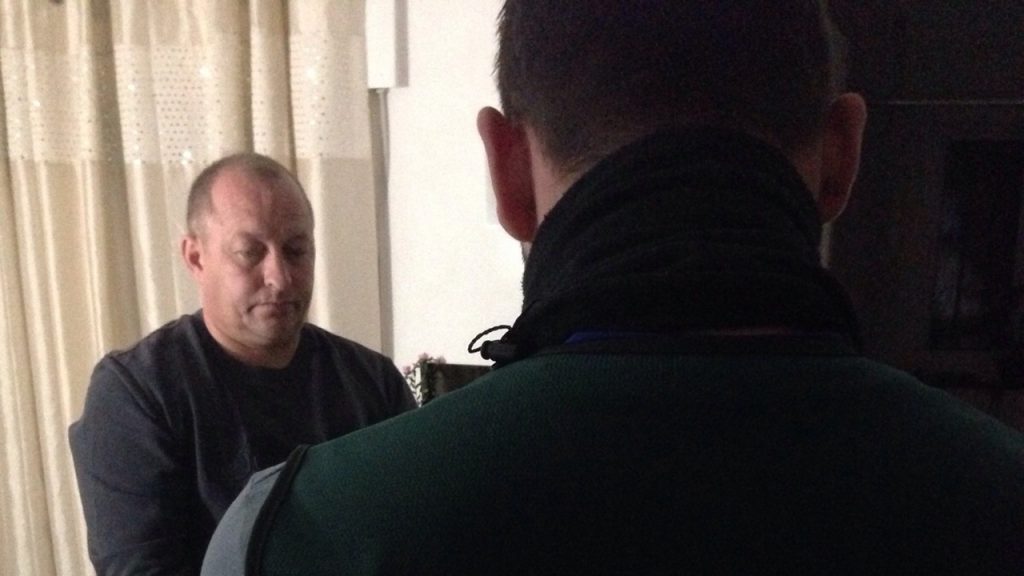
Dawes facing a Guardia Civil officer as his Mijas Costa home is raided in November 2015
in Benalmadena in November 2015. In court cases already dealt with, associates of Dawes were found to be in control of a mobile phone business registered at Companies House in the UK, selling encrypted sim cards with Blackberry phones at €2,000 a piece with branches all over the world. There was little legitimate business done by the mobile phone company. In reality, it was a cover for an encrypted network of communications designed to thwart all eavesdropping attempts by law enforcement agencies. One company director was jailed for 10 years in Portugal after being caught with a 167 kilo shipment of cocaine linked to Dawes. Another director, overseeing a cocaine shipment that went missing, was shot dead in Antwerp in 2012 leading to a wild west of tit for tat shootings in Netherlands and abroad which claimed upwards of 15 lives. Some of the victims were mistaken innocents and others were simply girlfriends or relatives of targets.
Oblivious the load had already been intercepted, Wheat then organised a meeting with “Sergio” at the Cafe Kleber in Paris. There Wheat gave the undercover baggage handler further instructions about where the shipment would be moved to and how it was to be split into four consignments. One split was just over 300 kilos which would go to representatives of the Camorra mafia gang from Naples. The Camorra shipment was allowed to travel out of the airport in a truck driven by an Italian before being stopped at the German border apparently on its way via Germany to a rendezvous in a Camorra held part of Italy. Two members of the Amato-Pagano clan linked to the Camorra, Vincenzo Aprea and Carmine Russo, both 49 years old, who had been dealing with Nathan Wheat were arrested and have been charged along with the lorry driver. Aprea is believed to be the Camorra clan’s representative in Spain.
The French authorities moved in on Nathan Wheat and his 30-year-old Nottingham colleague Kane Price. They were arrested while out shopping on the Champs Elysees. Price, who gave his occupation as a used car salesman, was bailed through lack of evidence, but after returning to the UK was then arrested handling a large amount of MDMA on behalf of a cell working for Robert Dawes. He was sentenced to three and half years following a court case at Stafford Crown Court in 2016. Wheat remains in custody in France.
Meanwhile, the Guardia Civil upped its monitoring of Dawes. Unable to break the encryption communications he was employing they resorted to tried and tested tactics used pursuing ETA terrorists. Surveillance of Dawes and his associates led investigators to a meeting at the five star Villa Magna hotel in Madrid on September 23, 2014. The meeting was between Dawes, a Columbian from the Medellin cartel and a Spanish/English interpreter. The Guardia Civil legally wired into the hotel’s CCTV and audio system to pick up the conversation and film the meeting. During the chat, Dawes revealed he could get narcotics shipments through most ports and airports in Europe through corrupt contacts. He mentioned contacts in ports such as Algeciras and Valencia in Spain, using ships from Venezuela and from Santos, Brazil, cargo planes in the Netherlands, ships from Morocco to Spain, containers in Antwerp, and shipments by commercial plane in suitcases through airports such as Brussels. Only the airport at Barajas, Madrid was impenetrable, he told the Columbians. His price was 30 per cent commission on the value of anything that went through the transport lines he controlled air, sea or land. Those networks would inevitably reveal a layer of corrupt officials within the import/export chain and law enforcement, whose loyalty Dawes had bought.
On tape Dawes was also caught boasting about the 1.3 tonnes of cocaine Paris shipment “the one that was in the news using the cases…that was mine”, he said. He appeared to be trying to convince the Medellin drug boss of his credentials. He was also caught telling the Columbian that the only way he would communicate with the Columbians would be via a Blackberry PGP encrypted mobile which he would supply to whoever he dealt with.
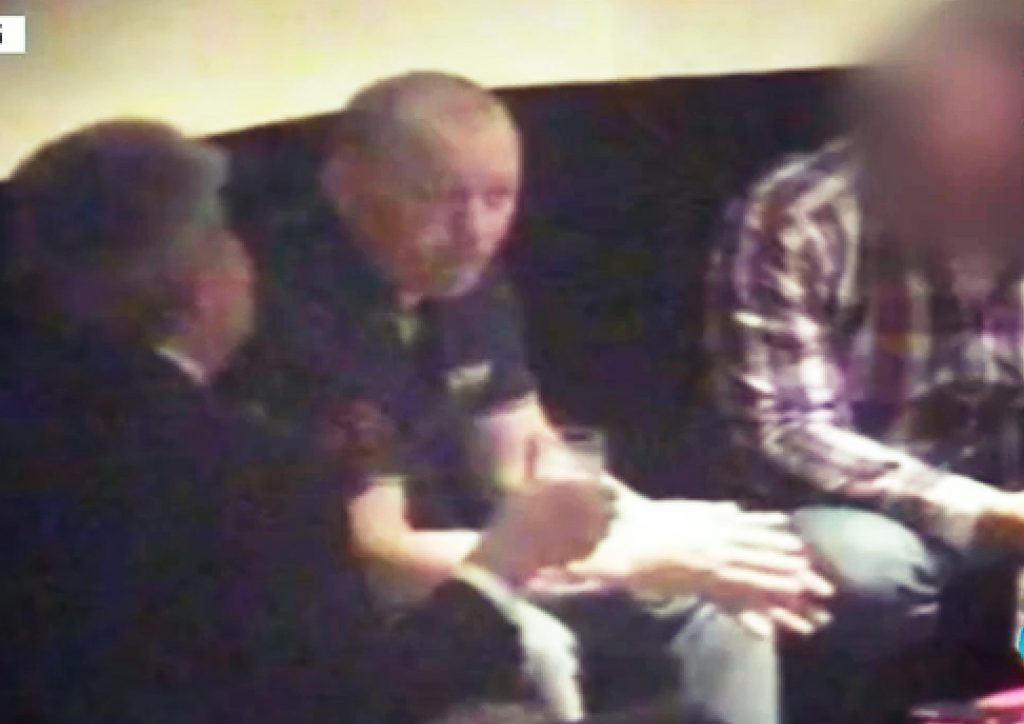
Robert Dawes discusses business over drinks with the Columbians at Hotel Villa Magna, Madrid
Dawes’ legal team, led by the so called “Jihadist’s Lawyer” Xavier Nogueras, are desperately trying to prevent this evidence from being included in the French court case, claiming that the material was illegally obtained. Dawes’ legal team is also interested in the use of informants in the case and in particular a reference in the case file to an infamous French drug smuggler Sofiane Hambli.
After the raid on Dawes’ Benalmadena villa on November 12 2015, the scale of his dealings has also become clearer. Documentation seized by Spain’s Guardia Civil investigators shows that the Briton had banking and telephone contacts spanning five continents in more than 50 countries including significant contacts in Afghanistan, UK, Malta, Syria, Italy, France, Netherlands, Nigeria, Finland, Somalia, Colombia, Pakistan, Russia, Australia, New Zealand and China.
Via his legal team, Dawes – currently being held at Fresnes prison near Paris – is expected to continue to attempt to water down the evidence which mounts against him and use delaying tactics in his case.
